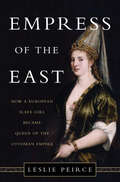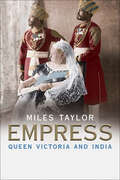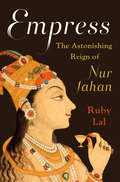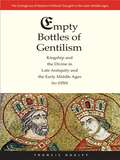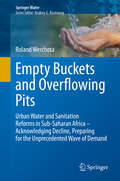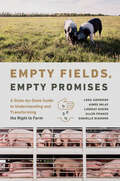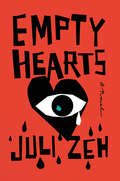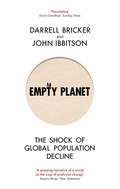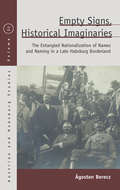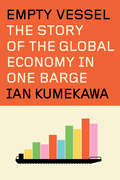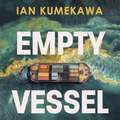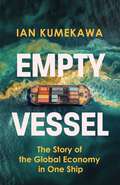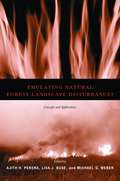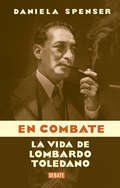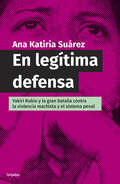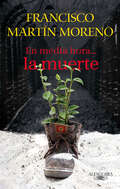- Table View
- List View
Empress of the East: How a European Slave Girl Became Queen of the Ottoman Empire
by Leslie PeirceThe extraordinary story of the Russian slave girl Roxelana, who rose from concubine to become the only queen of the Ottoman empireIn Empress of the East, historian Leslie Peirce tells the remarkable story of a Christian slave girl, Roxelana, who was abducted by slave traders from her Ruthenian homeland and brought to the harem of Sultan Suleyman the Magnificent in Istanbul. Suleyman became besotted with her and foreswore all other concubines. Then, in an unprecedented step, he freed her and married her. The bold and canny Roxelana soon became a shrewd diplomat and philanthropist, who helped Suleyman keep pace with a changing world in which women, from Isabella of Hungary to Catherine de Medici, increasingly held the reins of power.Until now Roxelana has been seen as a seductress who brought ruin to the empire, but in Empress of the East, Peirce reveals the true history of an elusive figure who transformed the Ottoman harem into an institution of imperial rule.
Empress: Queen Victoria and India
by Miles TaylorAn entirely original account of Victoria’s relationship with the Raj, which shows how India was central to the Victorian monarchy from as early as 1837 In this engaging and controversial book, Miles Taylor shows how both Victoria and Albert were spellbound by India, and argues that the Queen was humanely, intelligently, and passionately involved with the country throughout her reign and not just in the last decades. Taylor also reveals the way in which Victoria’s influence as empress contributed significantly to India’s modernization, both political and economic. This is, in a number of respects, a fresh account of imperial rule in India, suggesting that it was one of Victoria’s successes.
Empress: The Astonishing Reign Of Nur Jahan
by Ruby LalFour centuries ago, a Muslim woman ruled an empire. When it came to hunting, she was a master shot. As a dress designer, few could compare. An ingenious architect, she innovated the use of marble in her parents’ mausoleum on the banks of the Yamuna River that inspired her stepson’s Taj Mahal. And she was both celebrated and reviled for her political acumen and diplomatic skill, which rivaled those of her female counterparts in Europe and beyond. In 1611, thirty-four-year-old Nur Jahan, daughter of a Persian noble and widow of a subversive official, became the twentieth and most cherished wife of the Emperor Jahangir. While other wives were secluded behind walls, Nur ruled the vast Mughal Empire alongside her husband, and governed in his stead as his health failed and his attentions wandered from matters of state. An astute politician and devoted partner, Nur led troops into battle to free Jahangir when he was imprisoned by one of his own officers. She signed and issued imperial orders, and coins of the realm bore her name. Acclaimed historian Ruby Lal uncovers the rich life and world of Nur Jahan, rescuing this dazzling figure from patriarchal and Orientalist clichés of romance and intrigue, and giving new insight into the lives of women and girls in the Mughal Empire, even where scholars claim there are no sources. Nur’s confident assertion of authority and talent is revelatory. In Empress, she finally receives her due in a deeply researched and evocative biography that awakens us to a fascinating history.
Empty Bottles of Gentilism
by Francis OakleyIn this book--the first volume in his groundbreaking trilogy on the emergence of western political thought--Francis Oakley explores the roots of secular political thinking by examining the political ideology and institutions of Hellenistic and late Roman antiquity and of the early European middle ages. By challenging the popular belief that the ancient Greek and Roman worlds provided the origins of our inherently secular politics, Oakley revises our understanding of the history of political theory in a fundamental and far-reaching manner that will reverberate for decades. This book lays the foundations for Oakley's next two volumes, which will develop his argument that it is in the Latin middle ages that we must seek the ideological roots of modern political secularism.
Empty Breadbasket? The Coming Challenge to America's Food Supply and What We Can Do About It
by The Cornucopia Project of Rodale PressThe massive U.S. food supply which provides us with almost any food we want-at any time of year-is surprisingly fragile. Without a change in directions there will be a depletion of natural resources: soil, water, energy. This book is a result of the study conducted by the Cornucopia Project of Rodale Press to document the vulnerability, and suggest how consumers, farmers and food industry can improve.
Empty Buckets and Overflowing Pits: Urban Water and Sanitation Reforms in Sub-Saharan Africa – Acknowledging Decline, Preparing for the Unprecedented Wave of Demand (Springer Water)
by Roland WerchotaThis book provides a multi-level and multi-dimensional insight into urban water and sanitation development by analyzing sector reforms in Africa. With the recent events in mind - water shortages in Cape Town, widespread cholera in Haiti, mass-migration from low-income countries, etc. – it elaborates a pressing topic which is directly linked to the precarious living conditions of the urban poor in the developing countries. It is urgent to acknowledge the proposed findings and recommendations of the book which will help to improve the situation of potential refugees in their home countries with a realistic vision for the development of the most basic of all life supporting services.So many efforts to reverse the negative trend in water and sanitation development have failed or targets have been repeatedly missed by far without notable consequences for decision makers on different levels and institutions. It has unnecessarily consumed many young lives, contributed to keep billions in poverty until today and fostered discrimination of women. The knowledge gap and the confusion in the sector lined out in the book becomes evident when a national leader in a low-income country declares a state of emergency in urban water and sanitation while at the same time global monitoring publishes an access figure for urban water of over 90% for the same country. It is time to change this with an effective sector development concept for our partner countries and a more realistic discourse on global level.The book argues for a sweeping rethinking and combines extended local knowledge, lessons learned from history in advanced countries and thorough research on reforms in Francophone and Anglophone developing countries. This was possible because the writer was working in Sub-Saharan partner countries for almost 30 years as an integrated long term advisor in different sector institutions (ministry, regulator, financing basket and different sizes of utilities) and had the opportunity to cooperate closely with the main development partners.The reader has the opportunity to obtain a comprehensive understanding of how the sector works and sector institutions in low-income countries function and can discover the reasons behind success and failures of reforms. The book also covers issues which have a significant influence on urban water and sanitation development but are hardly the subject of discussions. It helps to make the shortcomings of the water and sanitation discourse more apparent and assist institutions to move beyond their present perceptions and agendas. All of this makes the book different from other literature about urban water and sanitation in the developing world.
Empty Fields, Empty Promises: A State-by-State Guide to Understanding and Transforming the Right to Farm (Rural Studies Series)
by Loka Ashwood Danielle Diamond Allen Franco Aimee Imlay Lindsay KuehnThe right to farm is essential to everyone's survival. Since the late 1970s, states across the nation have adopted so-called right-to-farm laws to limit nuisance suits loosely related to agriculture. But since their adoption, there has yet to be a comprehensive analysis of what these laws do and who they benefit. This book offers the first national analysis and guide to these laws. It reveals that they generally benefit the largest operators, like processing plants, while traditional farmers benefit the least. Disfavored most of all are those seeking to defend their homes and environment against multinational corporations that use right-to-farm laws to strip neighboring owners of their property rights. Through what the book calls the "midburden," right-to-farm laws dispossess the many in favor of the few, paving the path to rural poverty. Empty Fields, Empty Promises summarizes every state's right-to-farm laws to help readers track and navigate their local and regional legal landscape. The book concludes by offering paths forward for a more distributed and democratic agrifood system that achieves agricultural, rural, and environmental justice.
Empty Hearts: A Novel
by Juli ZehA prescient political and psychological thriller ripped from tomorrow's headlines, by one of Germany's most celebrated contemporary novelistsA few short years from now, the world is an even more uncertain place than it is today, and politics everywhere is marching rightward: Trump is gone, but Brexit is complete, as is Frexit. There's a global financial crisis, armed conflict, and mass migration, and an ultrapopulist movement governs in Germany. With their democracy facing the wrecking ball, most well-off Germans turn inward, focusing on their own lives. Britta, a wife, mother, and successful businesswoman, ignores the daily news and concentrates on her family and her work running a clinic specializing in suicide prevention. But her legitimate business is connected to a secret and far more lucrative operation known as The Bridge, an outfit that supplies terrorist organizations looking to employ suicide bombers. Using a complex candidate-identifying algorithm designed by Babak, a brilliant programmer and Britta's only employee, The Bridge has effectively cornered the market, and terrorism never takes place without Britta's services—which is why news of a thwarted suicide attack in Leipzig comes as a shock. Then The Bridge's database is stolen, driving Britta, Babak, and their latest recruit into hiding. On their heels is a new terrorist organization called the Empty Hearts, a group unlike any Britta and Babak have encountered before. Part suspenseful thriller, part wickedly effective social satire, Empty Hearts is a novel for our times, examining urgent questions of morality, politics, and culture and presenting a startling vision of a future where empathy is a thing of the past.
Empty Planet: The Shock of Global Population Decline
by John Ibbitson Darrell Bricker**A SUNDAY TIMES MUST-READ**'Riveting and vitally important' - Steven Pinker'A gripping narrative of a world on the cusp of profound change' - Anjana Ahuja, New StatesmanEmpty Planet offers a radical, provocative argument that the global population will soon begin to decline, dramatically reshaping the social, political and economic landscape.For half a century, statisticians, pundits and politicians have warned that a burgeoning planetary population will soon overwhelm the earth's resources. But a growing number of experts are sounding a different kind of alarm. Rather than growing exponentially, they argue, the global population is headed for a steep decline. Throughout history, depopulation was the product of catastrophe: ice ages, plagues, the collapse of civilizations. This time, however, we're thinning ourselves deliberately, by choosing to have fewer babies than we need to replace ourselves. In much of the developed and developing world, that decline is already underway, as urbanisation, women's empowerment, and waning religiosity lead to smaller and smaller families. In Empty Planet, Ibbitson and Bricker travel from South Florida to Sao Paulo, Seoul to Nairobi, Brussels to Delhi to Beijing, drawing on a wealth of research and firsthand reporting to illustrate the dramatic consequences of this population decline - and to show us why the rest of the developing world will soon join in. They find that a smaller global population will bring with it a number of benefits: fewer workers will command higher wages; good jobs will prompt innovation; the environment will improve; the risk of famine will wane; and falling birthrates in the developing world will bring greater affluence and autonomy for women. But enormous disruption lies ahead, too. We can already see the effects in Europe and parts of Asia, as aging populations and worker shortages weaken the economy and impose crippling demands on healthcare and vital social services. There may be earth-shaking implications on a geopolitical scale as well. Empty Planet is a hugely important book for our times. Captivating and persuasive, it is a story about urbanisation, access to education and the empowerment of women to choose their own destinies. It is about the secularisation of societies and the vital role that immigration has to play in our futures.Rigorously researched and deeply compelling, Empty Planet offers a vision of a future that we can no longer prevent - but that we can shape, if we choose to.
Empty Planet: The Shock of Global Population Decline
by John Ibbitson Darrell Bricker**A SUNDAY TIMES MUST-READ**'Riveting and vitally important' - Steven Pinker'A gripping narrative of a world on the cusp of profound change' - Anjana Ahuja, New StatesmanEmpty Planet offers a radical, provocative argument that the global population will soon begin to decline, dramatically reshaping the social, political and economic landscape.For half a century, statisticians, pundits and politicians have warned that a burgeoning planetary population will soon overwhelm the earth's resources. But a growing number of experts are sounding a different kind of alarm. Rather than growing exponentially, they argue, the global population is headed for a steep decline. Throughout history, depopulation was the product of catastrophe: ice ages, plagues, the collapse of civilizations. This time, however, we're thinning ourselves deliberately, by choosing to have fewer babies than we need to replace ourselves. In much of the developed and developing world, that decline is already underway, as urbanisation, women's empowerment, and waning religiosity lead to smaller and smaller families. In Empty Planet, Ibbitson and Bricker travel from South Florida to Sao Paulo, Seoul to Nairobi, Brussels to Delhi to Beijing, drawing on a wealth of research and firsthand reporting to illustrate the dramatic consequences of this population decline - and to show us why the rest of the developing world will soon join in. They find that a smaller global population will bring with it a number of benefits: fewer workers will command higher wages; good jobs will prompt innovation; the environment will improve; the risk of famine will wane; and falling birthrates in the developing world will bring greater affluence and autonomy for women. But enormous disruption lies ahead, too. We can already see the effects in Europe and parts of Asia, as aging populations and worker shortages weaken the economy and impose crippling demands on healthcare and vital social services. There may be earth-shaking implications on a geopolitical scale as well. Empty Planet is a hugely important book for our times. Captivating and persuasive, it is a story about urbanisation, access to education and the empowerment of women to choose their own destinies. It is about the secularisation of societies and the vital role that immigration has to play in our futures.Rigorously researched and deeply compelling, Empty Planet offers a vision of a future that we can no longer prevent - but that we can shape, if we choose to.
Empty Signs, Historical Imaginaries: The Entangled Nationalization of Names and Naming in a Late Habsburg Borderland (Austrian and Habsburg Studies #27)
by Ágoston BereczSet in a multiethnic region of the nineteenth-century Habsburg Empire, this thoroughly interdisciplinary study maps out how the competing Romanian, Hungarian and German nationalization projects dealt with proper names. With particular attention to their function as symbols of national histories, Berecz makes a case for names as ideal guides for understanding historical imaginaries and how they operate socially. In tracing the changing fortunes of nationalization movements and the ways in which their efforts were received by mass constituencies, he provides an innovative and compelling account of the historical utilization, manipulation, and contestation of names.
Empty Treasures
by Warren AdlerThe corruptive power of money and ambition in American politics begins in Venice where Elly, a Washington reporter trying to repair a bad marriage, suddenly spots a professional jeweler, a key figure in the world of Washington's powerful social and political elite. When she returns to Washington she is shocked to discover that the jeweler has not returned and has, in effect, disappeared. This piques her curiosity and what she uncovers goes to the heart of political corruption on a grand scale; deals with diamonds smuggled into the country to finance a Presidential political campaign and how money and politics impacts family, children, friends and lovers. This tantalizing and complex thriller deals with the dark side of ambition and the lengths people will go to in an effort to attain political power.
Empty Vessel: The Story of the Global Economy in One Barge
by Ian KumekawaThe rise of globalization and financialization as seen from a barge—one Swedish barge, to be exact, built in 1979 "The many-headed hydra of neoliberalism has found its chronicler." —Sven Beckert, author of Empire of Cotton"I&’ve rarely read a book that so deftly entwines a single, accessible story with the broad forces of globalization. A stunningly original history." —Maya Jasanoff, author of The Dawn WatchWhat do a barracks for British troops in the Falklands War, a floating jail off the Bronx, and temporary housing for VW factory workers in Germany have in common? The Balder Scapa: a single barge that served all three roles. Though the name would eventually change to Finnboda 12. And then to Safe Esperia. And later on, to the Bibby Resolution. And after that . . . in short, a vessel with so many names, and so many fates, that to keep it in our sights—as the protagonist of this fascinating economic parable—Ian Kumekawa has no choice but to call it, simply, the Vessel. Despite its sturdy steel structure, weighing 9,500 deadweight tons, the Vessel is a figure as elusive and abstract as the offshore market it comes to embody: a world of island tax havens, exploited labor forces, free banking zones, Thatcherism, Reaganomics, and mass incarceration, where even the prisoners are held offshore. Fitted with modular shipping containers, themselves the product of standardized global trade, the ship could become whatever the market demanded. Whether caught in an international dispute involving Hong Kong, Nigeria, Indonesia, and the Virgin Islands—to be settled in an English court of law—or flying yet another foreign &“flag of convenience&” to mask its ownership—the barge is ever a container for forces much larger than even its hulking self. Empty Vessel is a jaw-dropping microhistory that speaks volumes about the global economy as a whole. In following the Vessel—and its Sister Vessel, built alongside it in Stockholm—from one thankless task to the next, Kumekawa connects the dots of a neoliberal world order in the making, where regulation is for suckers and &“Made in USA&” feels almost quaint.
Empty Vessel: The Story of the Global Economy in One Ship
by Ian Kumekawa'Thrilling, meticulous and wondrously original' PHILIPPE SANDSA jaw-dropping microhistory of the global economy over the last fifty years told through the many lives of a single ship.At 94 meters long and 9,500 deadweight tonnes, once called the Bibby Resolution, is an unremarkable hulk, crossing the oceans unnoticed. And yet, the astonishing journey of this boat can tell us the story of the modern world.First built as a Swedish offshore oil rig in the 1970s, it went on to become a barracks for British soldiers in the Falklands War in the 1980s, a jail off New York in the 1990s, a prison in Portland in the 2000s, and accommodation for Nigerian oil workers off the coast of Africa in the 2010s. It has been called Safe Esperia, HMP The Weare, even 'The Love Boat'. In each of its lives this empty vessel has been commanded by economic forces much larger than itself: private investment, war, mass incarceration, imperial interests, national sovereignty, inflation, booms, busts and greed.Through its encounters with a world of island tax havens, the English court system, exploited labour forces, free banking zones or immigration politics, the ordinary boat at the heart of this story reveals our complex modern economy to us, connecting the dots of a dramatically changing world in the making, and warning us of its dangerous consequences.
Empty Vessel: The Story of the Global Economy in One Ship
by Ian Kumekawa'Thrilling, meticulous and wondrously original' PHILIPPE SANDSA jaw-dropping microhistory of the global economy over the last fifty years told through the many lives of a single ship.At 94 meters long and 9,500 deadweight tonnes, once called the Bibby Resolution, is an unremarkable hulk, crossing the oceans unnoticed. And yet, the astonishing journey of this boat can tell us the story of the modern world.First built as a Swedish offshore oil rig in the 1970s, it went on to become a barracks for British soldiers in the Falklands War in the 1980s, a jail off New York in the 1990s, a prison in Portland in the 2000s, and accommodation for Nigerian oil workers off the coast of Africa in the 2010s. It has been called Safe Esperia, HMP The Weare, even 'The Love Boat'. In each of its lives this empty vessel has been commanded by economic forces much larger than itself: private investment, war, mass incarceration, imperial interests, national sovereignty, inflation, booms, busts and greed.Through its encounters with a world of island tax havens, the English court system, exploited labour forces, free banking zones or immigration politics, the ordinary boat at the heart of this story reveals our complex modern economy to us, connecting the dots of a dramatically changing world in the making, and warning us of its dangerous consequences.
Emulating Natural Forest Landscape Disturbances: Concepts and Applications
by Ajith H. Perera Lisa J. Buse Michael G. WeberThis comprehensive collection of provocative papers provides a scientific foundation for justifying the use of and a solid framework for examining the ambiguities inherent in emulating natural forest landscape disturbance. Contributors range from policymakers and forestry professionals to academics and conservationists, offering a balanced view of the promises and challenges of the forest management paradigm in sustaining forest landscapes.
Emulating Natural Forest Landscape Disturbances: Concepts and Applications (Forest Research Information Paper Ser. #No. 149)
by Lisa J. Buse Michael G. Weber Eds. Perera Ajith H.What is a natural forest disturbance? How well do we understand natural forest disturbances and how might we emulate them in forest management? What role does emulation play in forest management? Representing a range of geographic perspectives from across Canada and the United States, this book looks at the escalating public debate on the viability of natural disturbance emulation for sustaining forest landscapes from the perspective of policymakers, forestry professionals, academics, and conservationists. This book provides a scientific foundation for justifying the use of and a solid framework for examining the ambiguities inherent in emulating natural forest landscape disturbance. It acknowledges the divergent expectations that practitioners face and offers a balanced view of the promises and challenges associated with applying this emerging forest management paradigm.The first section examines foundational concepts, addressing questions of what emulation involves and what ecological reasoning substantiates it. These include a broad overview, a detailed review of emerging forest management paradigms and their global context, and an examination of the ecological premise for emulating natural disturbance. This section also explores the current understanding of natural disturbance regimes, including the two most prevalent in North America: fire and insects. The second section uses case studies from a wide geographical range to address the characterization of natural disturbances and the development of applied templates for their emulation through forest management. The emphasis on fire regimes in this section reflects the greater focus that has traditionally been placed on understanding and managing fire, compared with other forms of disturbance, and utilizes several viewpoints to address the lessons learned from historical disturbance patterns. Reflecting on current thinking in the field, immediate challenges, and potential directions, the final section moves deeper into the issues of practical applications by exploring the expectations for and feasibility of emulating natural disturbance through forest management.
En Garde
by Sarah Hanson-YoungWhen Sarah Hanson-Young called out the abuse she received from male parliamentarians as slut-shaming, she sparked a national conversation about the rampant sexism in politics. Placing the responsibility on women to defend themselves is the same cheap trick as asking, why didn't she just fight back? After witnessing the relentless verbal abuse levelled at female parliamentarians and public figures, Hanson-Young is convinced that now is the time to name it and not retreat.'A riveting insider's view of bullying and sexism in federal parliament.' GILLIAN TRIGGS
En Mi Opinión: Necesitamos una constitución de la clase (Text Connections Guided Close Reading)
by La clase de 4 grado del profesor MillerNIMAC-sourced textbook
En combate: La vida de Lombardo Toledano
by Daniela SpenserPara sus seguidores y el sistema político, Vicente Lombardo Toledano es un héroe... Pero la realidad es más compleja. Fundador de numerosos sindicatos en México y en América Latina, Lombardo Toledano no sólo fue un organizador sino un negociador que destrababa conflictos imposibles. Fue un creyente en el orden, decidido a mantener la estabilidad del país y de la región a toda costa. Un operador del gobierno mexicano y, cuando lo creía oportuno, de las naciones vecinas y de la Unión Soviética. Un hombre identificado como comunista que, sin embargo, jamás perteneció a ese partido, y que fue vinculado con el PRI, del que no era miembro sino comparsa. Con una vida apasionante, fundó trascendentales instituciones como la CTM y la Confederación de Trabajadores de América Latina, que construyó como organizaciones sindicales así como mecanismos de negociación, cuando sus normas le estorbaban. En una biografía rigurosa y fluida, Daniela Spenser relata la vida de Lombardo Toledano, un hombre que refleja la complejidad del México posrevolucionario, tanto la esperanza que despertó como los proyectos fallidos que dejó.
En defensa del Modelo
by Guillermo MorenoMemoria política en primera persona del funcionario peronista de los gobiernos de Néstor y Cristina Kirchner más resistido por la oposición del momento y criticado por los grandes medios de comunicación y, al mismo tiempo, elogiado por los partidarios de la "década ganada". Febrero de 2003: un economista, cuadro técnico del peronismo de la Capital Federal, es invitado a reunirse con el gobernador de Santa Cruz. Guillermo Moreno no conocía a Néstor Kirchner, pero quince días después de aquel encuentro comenzó a militar a su lado, y hasta el fin del segundo gobierno de Cristina Fernández fue uno de los principales referentes del "Modelo". En este libro, Moreno presenta desde su perspectiva el trasfondo menos conocido de la toma de decisiones clave que marcaron el pulso político y económico del país durante los años en que formó parte del gobierno, y que involucraron, entre otros, al Correo Argentino, a ARSAT, a los sectores de la carne, la energía y el campo, al Grupo Clarín y a Papel Prensa. Pero aquí también están sus definiciones más contundentes sobre el dólar, la inflación, el peronismo, la gobernabilidad, la oligarquía. Y en un registro más personal, la despedida a su jefe político y sus encuentros con Diego Maradona y el Papa Francisco. Memoria política del funcionario kirchnerista más cuestionado por los grandes medios, En defensa del Modelo no elude una autocrítica de cara al futuro, y propone, desde adentro, el más completo recorrido a través del período que sus partidarios consideran la "década ganada" de la Argentina.
En la piel de una yihadista: Una joven occidental en el corazón del Estado Islámico
by Anna ErelleEl testimonio de una joven occidental captada por el estado islámico. Mélodie acaba de convertirse al islam cuando conoce al jefe de una brigada islamista a través de Facebook. En cuarenta y ocho horas Bilel se enamora de ella, la llama día y noche, y le insiste para que viaje a Siria y se reúna con él para hacer su yihad. Le pide que se case con él y le promete una vida paradisíaca junto a miles de jóvenes europeos que viven allí. Mélodie acepta y prepara su huída en secreto... El Estado Islámico recluta cada semana a cientos de jóvenes como Mélodie. Anna Erelle, seudónimo de una reportera free-lance en la treintena, adopta la personalidad de Mélodie para adentrarse en el mundo de los yihadistas. La periodista verifica las confidencias que su "pretendiente", mano derecha del califa del Estado Islámico, Abu Bakr al-Baghdadi, le cuenta a su "futura esposa", y desvela los métodos que utilizan para convencer a jóvenes y convertirlos en adeptos incondicionales a la causa islamista. En estos momentos la vida de la joven corre un serio peligro, y vive protegida por el Ministerio del Interior francés bajo una identidad falsa. El Estado Islámico ha lanzado una fatwa contra ella pidiendo su muerte.
En la sombra
by Príncipe Harry, duque de SussexFue una de las imágenes más desgarradoras del siglo XX: dos niños, dos príncipes, caminando detrás del féretro de su madre mientras el mundo contemplaba la escena con pesar... y horror. A la vez que se daba sepultura a Diana, princesa de Gales, miles de millones de personas se preguntaron qué debían de pensar y sentir esos príncipes y qué rumbo tomarían sus vidas en adelante. En el caso de Harry, esta es, por fin, esa historia. Con su franqueza directa y sin concesiones, En la sombra es una publicación que marcará un hito, llena de lucidez, revelaciones, introspección y sabiduría, adquirida a un alto coste, sobre el eterno poder del amor.
En legítima defensa: Yakiri Rubio y la bran batalla contra la violencia machista y el sistema penal
by Ana Katiria Suárez CastroLa estremecedora historia de la joven y su larga lucha por obtener libertad y justicia. Una narración cruda e intensa de una mujer que se enfrentó a la violencia machista, a las instituciones patriarcales, a la corrupción del sistema penal... Y ganó. En diciembre de 2013, la joven Yakiri Rubio fue secuestrada por dos hombres que la condujeron a un hotel para violarla. Después de ultrajarla, uno de ellos intentó asesinarla. Ella acabó matando al agresor en defensa propia; sin embargo, la acusaron de homicidio calificado y la encarcelaron. La autora de este libro, Ana Katiria Suárez, es la abogada penalista que defendió a Yakiri Rubio. En una carrera contra el tiempo, después de haber tenido acceso a un expediente mutilado, su objetivo desde el primer momento fue demostrar que Yakiri actuó en legítima defensa tras haber sufrido una violación sexual. Con la pasión que caracterizó su defensa, la autora relata los pormenores de un proceso viciado desde el origen, repleto de omisiones, fallas y contubernios entre los delincuentes y la autoridad. Muy pronto, el caso se convirtió en una lucha personal por los derechos humanos y en una cruzada jurídica con perspectiva de género. Otros autores han opinado: "¡Qué sería de este país de machos donde campean la violencia, la misoginia y el odio, sin mujeres como Ana Katiria! ¡Qué sería de nosotros sin esas voces, como la suya, que no sólo claman justicia, sino que son capaces de arrancársela a un régimen que sistemáticamente nos la niega!" -Epigmenio Ibarra-
En media hora, la muerte
by Francisco Martín Moreno«¿Qué nos quedaba?: El fascismo alemán o el fascismo español… A eso se reducía la oferta política de los años treinta. ¿Y la democracia? Adiós a la República de Weimar, adiós a la República española: tendríamos que escoger entre dos dictaduras, con todas sus consecuencias...» Ante la inesperada confesión de un secreto celosamente guardado, se desata la poderosa necesidad por descubrir las raíces e historias de dos familias separadas por la religión, la geografía, el idioma y su visión del mundo y de la vida. Será la Guerra Civil española, y posteriormente la Segunda Guerra Mundial, la traumática experiencia que las hará coincidir en el doloroso exilio, tras terribles vivencias de horror y desconsuelo. Ya en México, en el destierro, habrán de encontrar un nuevo sentido a su existencia. Francisco Martín Moreno, hijo de refugiados, indaga con la disciplina del investigador y la pasión característica del novelista la historia de su familia, descubriendo complicidades, traiciones, ausencias irreparables y estremecedores amoríos que, en gran parte, definieron su destino.
